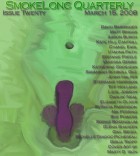Not many of the stories submitted to us are written in omniscient point of view. This story is particularly suited to this perspective. In fact, I don’t see how it could be written any other way. Did the events in “We” initially come to you in all these different voices?
I wrote this story in a writing group. I had just come through the media driven frenzy of Christmas and total consumerism and elevated status as a parent for obtaining the coveted Wii, for my children. It makes me puke. Yet I do it every year… anyway… I came through a harrowing day of shopping and was getting ready for bed, talking to my husband about how everyone in our community knew Toys R’ Us was expecting a new shipment of Wii’s on December 15, 2007, how there was talk of people sleeping in their cars in the parking lot overnight and how lucky we were to have gotten our Wii in August.
“We’re so lucky,” we said. “So smart.”
I had a very bad cold and cough and my husband and I laughed and joked as I coughed and hacked and chocked and couldn’t breathe.
“You’d probably step over my dead body and keep watching the hockey game,” I said, and we laughed and I choked some more.
And it came to me all at once. What if a woman did choke at say a dinner party and this paramedic takes her in an ambulance? Who is he and what’s his story? And maybe there’s an accident with the truck delivering the Wii’s to our store. What would happen then? How would “we” react?
I love the time continuum, from moment to moment, the influenced sound clips of our lives.
I love how this story captures the need of people to feel a part of something, even, or especially, if it’s tragedy. “On-lookers carry candles and bring silk flower arrangements they keep on hand for moments like this.” In a way, it’s a sick sort of existence. Why are we like this?
The “onlookers” have to represent a broad cross section of the population. You have the onlookers who cry or cheer and hug and watch and have a topic of conversation for weeks to come. You have the man who waves his hand through the air, uninterested, no blood or gore – he goes back inside. You have the people who keep flowers on hand, some who are perhaps lonely, looking for a connection even if it is one of grief.
Then you have the people who keep the flowers and lay them in memoriam because it’s wrong that people are dying on the corner of their street in their town in their country. They keep the flowers because they are genuinely sorry and are trying to do something to stop the deaths. Three more people die, they don’t give up. They get the light. We can make a difference.
You have the believers, and the non-believers.
Randall Brown recently asked. “Are people basically good?”
“Yes, we are.”
Your description of the winter sunset as dark, muted, and shallow, is gorgeous. I especially love that last work—shallow. It’s the perfect word. How long did you search for it?
On my drive to and from work I scoot down into a valley of low lying fields in the flood plain of the Nicomekl River. One night I saw this scene. The sky, more night than day, more black than midnight, the sun, rust not orange, not deep, but shallow. The woman’s breathing – shallow, the sunset – shallow. We? Shallow? Contraband Wiis. We do not search for perfect words, they are there when we need them.
This passage is pivotal to the story working. There has to be beauty or it’s just a cynical piece and that isn’t the intention.
How’s that novel coming along, Patricia?
The novel is freaking sensational! It’s smashing, it is. I’m for the most part, when I’m not stuck and desperate and unable to think past the characters’ names, having a blast writing it.
This is…my prediction, although I predicted other actors previously, I know my characters better now. I predict Drew Barrymore’s production company will pick up the film rights and her and her girlfriend, Cameron Diaz, will play Gina and Joanna. HA! We all have our dreams.
While reading through the annual Kathy Fish Fellowship applications, I was struck by the number of writers who were using flash as, to paraphrase, a means to an end. Most people weren’t writing flash because they loved the form, because it took them places other types of fiction didn’t. Instead, they were using it as a gateway into longer works—short stories, short story collections, novels. As a champion of flash, I found this discouraging. Is flash fiction less satisfying, in terms of either writing or reading, than longer works? Or is it that the markets still haven’t accepted flash as a legitimate form? Why do you write flash, and where do you see it taking you?
I think in many ways, flash has more impact than a longer body of work. The work of Kathy Fish for instance, resonates as the emotion comes to us through the beauty of her language with an immediate intimacy. That is nothing if not satisfying.
I don’t know where I see flash taking me; I do know that from writing flash, my novel is, I think, quite action packed, written in scenes like flashes, I hope, each leaving it’s own impact, bringing my reader to a deeper level of understanding of the characters, the situations, each scene being able to stand alone, carry it’s own information, emotion, knowledge, questions.
For me there’s a temptation, an allure to flash, a place to put all my thoughts that come outside of the novel but have to come out. Flash is my fix.



 The core workshop of SmokeLong Fitness is all in writing, so you can take part from anywhere at anytime. We are excited about creating a supportive, consistent and structured environment for flash writers to work on their craft in a community. We are thrilled and proud to say that our workshop participants have won, placed, or been listed in every major flash competition. Community works.
The core workshop of SmokeLong Fitness is all in writing, so you can take part from anywhere at anytime. We are excited about creating a supportive, consistent and structured environment for flash writers to work on their craft in a community. We are thrilled and proud to say that our workshop participants have won, placed, or been listed in every major flash competition. Community works.